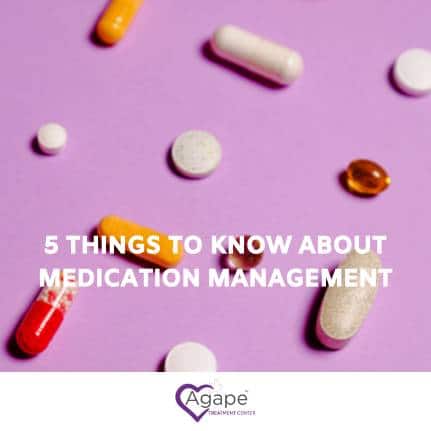
The most effective way to end discrimination against individuals struggling with mental illness is to discuss medication treatment. The overall goal is to not only end the stigma surrounding mental health but to also educate individuals on managing symptoms of their mental illness with medication. Here are a few things you need to know about medication management for mental health.
Table of Contents
ToggleTaking medication for your mental illness will not change who you are.
One of the most common concerns an individual struggling with a mental illness has is worrying if the medication they will be taking will change them. Often times, individuals may feel as though if they begin taking medication then their entire personality will change. Rather than focusing on how the medication may change and individual in negative ways, it is important to shift the focus on how the medication may help you feel more empowered to be more authentically yourself.
Many people on mental health medications do report changes in the way they experience pleasure, stress, and everyday life – but this is a good thing. Medication specifically for mental illness is designed to address the physiological symptoms of whatever mental illness you are suffering from. Common physiological symptoms due to an underlying mental illness include:
- Changes in sleep
- Appetite
- Fatigue
- Loss of motivation
- Heart palpitations
- Feeling restless
- Delusions
- Hallucinations
These are symptoms that affect your body and you have zero control over these things. Research shows that many changes in personality that arise from medication management are associated with the reduction of these symptoms and are typically positive.
There is nothing weak or wrong with you for having the need to take mental health medication or get help with medication management.
Societal pressures to maintain perfectionism and stigmas stemming from lack of understanding demands control over every aspect of our thoughts, behaviors, and accomplishments. Often times, when an individual is faced with something outside of their control – like mental illness – there is typically a process of self-shaming and feeling the need to fix the solution themselves.
The best way to combat this negative thinking is to remember that just as an individual requires certain chemicals and functions throughout the body in order to function, everyone also requires a healthy flow of neurotransmitters and chemicals within the brain to survive. Some brains produce the chemicals naturally while others may require assistance. Much like how some individuals produce their own insulin, other bodies require additional help in functioning properly. Therefore, mental health medication management should be viewed as an absolute necessity for the quality of your life.
Every person is different, and you need to find what mental health medication is best for you.
Just like any other medication, mental health medications are not an exact science because no two bodies work the same. Finding the appropriate medication for your mental health is not a one-size-fits-all process. The truth is, everyone’s body responds to medication in different ways. The most important aspect of finding the right medication for your mental illness is patience and persistence.
Just because your friend had a quick, positive experience with the first antidepressant she tried doesn’t mean that you will have the same experience. Also, just because your coworker had a terrible experience with the anti-anxiety medication he tried doesn’t mean you will either. If your medication isn’t working, it is important to remember you are not a failure. It is also vital to keep in mind that you may have to collaborate with your psychiatrist on determining what unique combination works best for you. Although it may take some time before you find the right balance of medication for your mental health, be open with your doctor about your needs.
Medication is not an easy fix but rather an important component of overall mental health.
Research has proven that medication alone is not the only component of managing your mental illness. Many prescribers are willing to write a prescription to treat the symptoms without requiring a follow-up or therapy with a mental health professional. Medication for your mental illness needs to be prescribed with oversight in order to determine if the medication is addressing what it is supposed to address.
A mental health professional can help you track changes in your symptoms as well as recommend additional mental health treatment options. If your mental illness symptoms are not eradicated immediately – do not be discouraged. Medications often remove some of the unpleasantries of your mental illness, but it does not provide you with the healing, education, and coping skills that you require in order to make changes to your environment and your life. It is always important that you are seeking individual therapy to also assist in managing your mental health.
Do not quit taking your medication when you begin to start feeling better.
Another important factor to remember is that medications designed for mental health are not meant to be short-term interventions. The way an inhaler helps you to breathe, or insulin supports your pancreas – mental health medications help your brain to regulate the flow of neurotransmitters. Your brain is unable to do these things on its own. Without the medication, your symptoms are likely to come back and commonly worse than before.
While it is some people may be successful in using mental health medications temporarily to manage symptoms and move forward, this is not the case for all people. More specifically, most mental illnesses have the capability of creating delusions for the individual suffering to believe they are fine. It is not uncommon for people to require multiple changes in medication over the years as their symptoms and bodies change. It is most important to remember to continue to manage your mental health medications unless prescribed otherwise by a doctor.
Getting Help With Mental Health Medication Management
It might take some time to adjust to your medications and find the right ones that work for you. In addition, if medications stop working, medication management can help people get back on the right track. If you or a loved one is battling mental illness and needs help finding the right balance of medication and therapy, don’t wait any longer. Contact us today.






